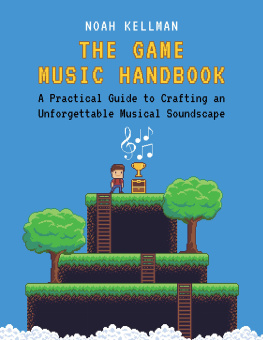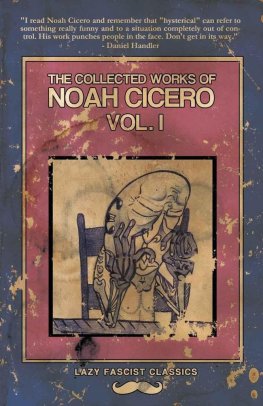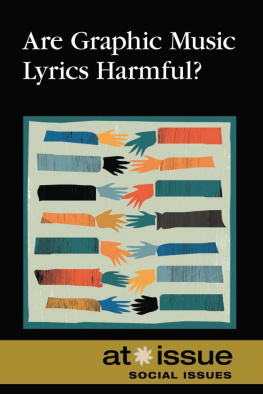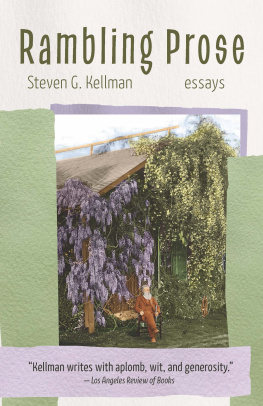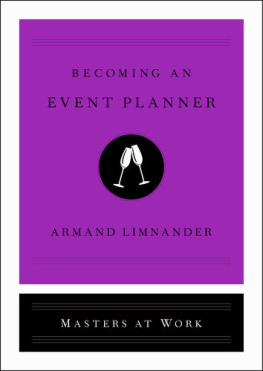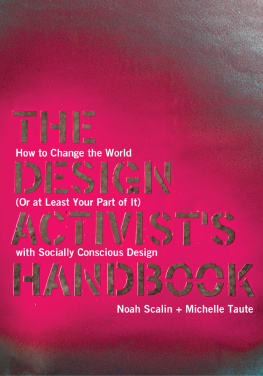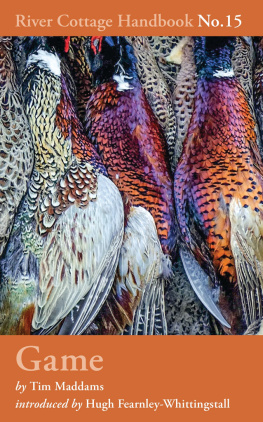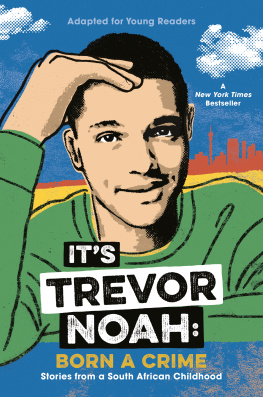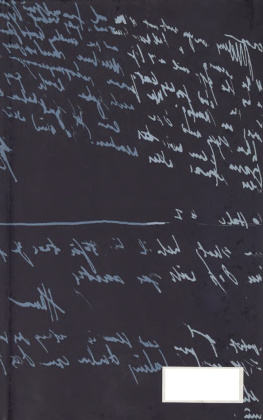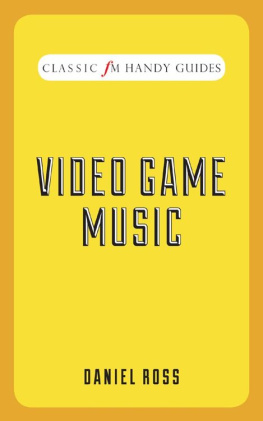Kellman Noah - The Game Music Handbook
Here you can read online Kellman Noah - The Game Music Handbook full text of the book (entire story) in english for free. Download pdf and epub, get meaning, cover and reviews about this ebook. year: 2020, publisher: Oxford University Press, Incorporated, genre: Home and family. Description of the work, (preface) as well as reviews are available. Best literature library LitArk.com created for fans of good reading and offers a wide selection of genres:
Romance novel
Science fiction
Adventure
Detective
Science
History
Home and family
Prose
Art
Politics
Computer
Non-fiction
Religion
Business
Children
Humor
Choose a favorite category and find really read worthwhile books. Enjoy immersion in the world of imagination, feel the emotions of the characters or learn something new for yourself, make an fascinating discovery.
- Book:The Game Music Handbook
- Author:
- Publisher:Oxford University Press, Incorporated
- Genre:
- Year:2020
- Rating:4 / 5
- Favourites:Add to favourites
- Your mark:
- 80
- 1
- 2
- 3
- 4
- 5
The Game Music Handbook: summary, description and annotation
We offer to read an annotation, description, summary or preface (depends on what the author of the book "The Game Music Handbook" wrote himself). If you haven't found the necessary information about the book — write in the comments, we will try to find it.
The Game Music Handbook — read online for free the complete book (whole text) full work
Below is the text of the book, divided by pages. System saving the place of the last page read, allows you to conveniently read the book "The Game Music Handbook" online for free, without having to search again every time where you left off. Put a bookmark, and you can go to the page where you finished reading at any time.
Font size:
Interval:
Bookmark:


Oxford University Press is a department of the University of Oxford. It furthers the Universitys objective of excellence in research, scholarship, and education by publishing worldwide. Oxford is a registered trade mark of Oxford University Press in the UK and certain other countries.
Published in the United States of America by Oxford University Press
198 Madison Avenue, New York, NY 10016, United States of America.
Oxford University Press 2020
All rights reserved. No part of this publication may be reproduced, stored in a retrieval system, or transmitted, in any form or by any means, without the prior permission in writing of Oxford University Press, or as expressly permitted by law, by license, or under terms agreed with the appropriate reproduction rights organization. Inquiries concerning reproduction outside the scope of the above should be sent to the Rights Department, Oxford University Press, at the address above.
You must not circulate this work in any other form and you must impose this same condition on any acquirer.
Library of Congress Cataloging-in-Publication Data
Names: Kellman, Noah, author.
Title: The game music handbook : a practical guide to crafting an unforgettable musical soundscape /
by Noah Kellman ; with foreword by Disasterpeace (aka Rich Vreeland)
Description: New York : Oxford University Press, 2020. | Includes bibliographical references and index.
Identifiers: LCCN 2020017864 (print) | LCCN 2020017865 (ebook) | ISBN 9780190938680 (hardback) |
ISBN 9780190938697 (paperback) | ISBN 9780190938710 (epub)
Subjects: LCSH: Video game musicInstruction and study. | Computer game musicInstruction and study.
Classification: LCC MT64.V53 K45 2020 (print) | LCC MT64.V53 (ebook) | DDC 781.5/4dc23
LC record available at https://lccn.loc.gov/2020017864
LC ebook record available at https://lccn.loc.gov/2020017865
In visual media, there is a tendency to treat music like polish. Hired late in the process, composers typically begin working on a project thats otherwise nearly complete. Our task is to put the contributions of the rest of the team in a more flattering light.
In video games, we have a chance to cultivate a different way. With the prevalence of small, flexible, independent teams, and a growing stable of smaller, more creatively lenient publishers, we as composers can take on a more involved role. We can exist more like artists and collaborators, and less like the last-minute afterthought, taken for granted. We can stop being outsiders and start to embed more deeply with our colleagues. We can create more opportunities to earn their trust and respect. We can play a critical role in shaping the trajectory of the games we make.
There are a million and one ways to structure music in games. Take The Secret of Monkey Island, where the score modulates effortlessly from song to song as you travel the Caribbean. Or perhaps Uurnog Uurnlimited, where music algorithms evolve alongside player choices that other games rarely acknowledge. The scale of whats possible continues to grow year over year. And within this space are ways you and I can contribute that sidestep typical expectations.
Doing your best work generally requires time and freedom beyond the norm. You need more of bothso that you have the space to maneuver out of false starts and dead ends. The more you intend to challenge yourself and dance along the edge of what is possible, the more flexibility you need. You cant go out to the fringes without the trust of your coworkers, and you cant make your way back in a beneficial manner without sufficient time. So, if you can, get involved early, and dont forget to take breaks. Deep work requires deep rest.
If you do find yourself on board at the outset: Congratulations! Welcome to the desert. At this stage, everything is uncertain, and anything is possible. In this unfamiliar territory, you may not always have a feel for the trajectory of a project, and your colleagues may not either. There can be anguish in trying to write music for a game that has yet to figure itself out. You may find it fruitless developing a musical style in such foggy surroundings. It can, therefore, be beneficial to put off the content aspect of production until you have a better sense of the scope, scale, and essence of the project. For the moment, research and development may be the best things you can do.
I found myself in this position during the development of Solar Ash Kingdom. It took years to solidify the identity and mechanics at the core of the game. If I had spent much of that time making music demos, trying to hit a moving target, it would have been rather inefficient. It proved more fruitful to focus on weird, novel, and spontaneous ideas, workflow tools, and audio systems.
Solar Ash Kingdom was the first fully 3D game I ever worked on, and I treated the experience like being in an educational sandbox. Learning about tangential disciplines has a way of stoking the mind, and I learned a whole lot of math. I challenged myself to reinvent wheels, building things Id seen other people do. I developed a tool for doing Doppler effects (how the pitch of a sound changes as you move quickly). I also built a dynamic reflection system, something Id seen in AAA games, like Overwatch. But I tried to find new ways to use them. You could use dynamic reflections as a stylistic effect instead of a realistic one. What if Doppler pitch effects were used not just to alter the pitch of moving objects, but music? I became singularly focused on building out systems that could react in dynamic ways as you move through three dimensions. Being so engrossed in a new environment led me toward ideas for systems Id never seen before as well. One example is a forest of trees that sing to you as you move through them. Your angle and velocity relative to each tree yield a different musical note. By diving so deep into sound propagation and vector math, I better understood the challenges and possibilities of this new paradigm, the 3D environment. And I came out the other side with ideas I would never have come up with otherwise, and a newfound ability to implement them. When you work in a more generalized way, youre more likely to create something with multiple uses down the road. Ive already applied much of the new math I picked up while working on Solar Ash Kingdom. When I need a way to modulate a sound based on its positional relationship to other objects, for instance, I can take the dot product of two unit vectors. Whether youre personally familiar with these examples is unimportant. With time and space to play, you can collect an assortment of tricks, forever available to you and your peers (if youre generous), for the benefit of the game, and beyond.
There are ways to contribute besides music, though it can be challenging at times. You may be working with subject matter, people, or genres unfamiliar to you. I wouldnt have a great idea about how to contribute to the design of a fighting game, for instance, beyond giving feedback about whether it feels good or not to play. There are times when its not a natural fit to chime in beyond musical boundaries, or perhaps you dont feel like it, and thats okay. Still, there may come a time when your unique background, skill set, and perspective afford you insights no one else has. This pre-production period is a great time to interface with new ideas outside of your comfort zone. When the pressure to deliver content isnt there yet, you have the opportunity to pick up new skills and learn new things from your colleagues.
Font size:
Interval:
Bookmark:
Similar books «The Game Music Handbook»
Look at similar books to The Game Music Handbook. We have selected literature similar in name and meaning in the hope of providing readers with more options to find new, interesting, not yet read works.
Discussion, reviews of the book The Game Music Handbook and just readers' own opinions. Leave your comments, write what you think about the work, its meaning or the main characters. Specify what exactly you liked and what you didn't like, and why you think so.

